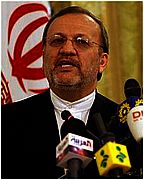New Round of Sanctions, Targeting People or Government?
» Mottaki’s Dinner Invitation, Another Defeat
No new agreements were reached during a U.N. dinner hosted by the Islamic Republic foreign minister Manouchehr Mottaki for Security Council members. Apart from China, members of the Security Council sent their deputy ambassadors to the event. As dinner talks failed, members of the Council began discussions over the forth round of sanctions against Iran.
Commenting on the dinner, U.S. State Department Spokesman Phillip Crowley said, “We see this as yet another missed opportunity by Iran to meet its international obligations,” signaling the possibility of imposing a new round of sanctions on the Islamic Republic.
The past three rounds of U.N. Security Council sanctions, as well as general sanctions imposed on Iran in the past, have focused on military-related trade and investment in Iran’s oil and petrochemicals industry. In the new round of sanctions, western countries are focusing on banking, oil and gas trade, and the “silent bomb” of Iran’s economy, gasoline.
Meanwhile, resuming its old technique of “bargaining to buy time,” the Iranian government has announced the new “Turkey-Brazil” formula after holding talks with the two nations’ officials. Returning from New York, Manouchehr Mottaki stopped in Turkey to announce that Iran is ready to hold talks with the European Union over its nuclear program in the neighboring country.
Although gasoline sanctions have not yet officially been imposed on Iran, their impact has been manifested to the Iranian government since some time ago. Recently, the Italian oil giant ENI cancelled plans to participate in the development of the Dar-Khoieen oil field; the French oil giant Total, which is Iran’s largest European oil partner, announced that it would not sell gasoline to Iran if new sanctions are imposed on the country; and the Russian oil giant Lukoil decided not to sell gasoline to Iran or invest in the country’s oil projects. Some speculate that China may also remove Iran from the list of its oil suppliers, all pointing to the emerging difficulties for Iran.
New pressure is put on Iran’s gasoline consumption while the country currently imports from 28 to 34 million litres of gasoline per day for domestic consumption. According to the deputy oil minister’s latest announcement, Iran has managed to raise production to only 7 million liters per day. In other words, a huge portion of Iran’s domestic gasoline consumption, regarded as the “silent bomb” of Iran’s economy, is imported. A new round of sanctions would have a significant impact on the country’s economy and people’s livelihoods.


